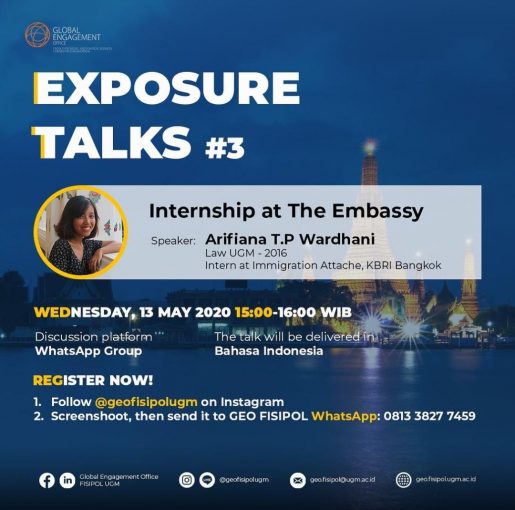
Yogyakarta, 13 Mei 2020ㅡGlobal Engagement Office (GEO) of Fisipol UGM is back again with the third episode of Exposure Talks. In this third episode, the Exposure Talks is quite different compared to the previous episodes. In this episode, Exposure Talk discussed the topic of internships abroad by having Arifiana T.P Warchani, a last year UGM Law Student, as the speaker. Last year, Arifiana – or commonly called as Tata – had the opportunity to have an internship in the Indonesia Republic Embassy in Bangkok. The discussion titled “Internship at the Embassy” started at 3 pm through Whatsapp group.
Exposure Talks registration was opened four days before the event. After registering, the audience was given a link to the Whatsapp group. Ten minutes before the discussion started, Raissa Almira (GEO’s Event & Media staff) as the moderator reminded the audience that the discussion will start soon. At 3 pm, Raissa introduced herself and explained the rules of the discussion. Raissa also allowed Tata to introduce herself.
As a moderator, Raissa allowed the audience to ask questions about the internship at the Embassy. The audience was very enthusiastic in giving their questions, starting from questions about the registration procedure, the job description and benefit of the internship, and the living cost. Tata then answered the questions perfectly.
Tata explained that there is no specific prerequisite to intern at the Indonesia’s Embassy at Bangkok. Students from all kinds of department and semester can apply. “When I am there, I met interns from all kinds of department; English, Economy, International Relations, Education, etc,” Tata said. The registration was not complicated. All you need to do is to send an email to the Culture and Education department of Indonesia’s Embassy at Bangkok. The email should include a permission to intern from student’s university, complete with subject and email body as an introduction.
Tata was placed in the Immigration Attache. She had to deal with things that is related to visas, passports, and other consulate functions such as marriage legalization and foreign documents. Specifically, Tata was placed in the front desk as someone who caters to Indonesia citizens needs related to their immigration document process. There are two shifts with different task in the Immigration office; 9.00-12.00 and 13.00-16.00 shift. The first shift is for the operational matters of visa registration. The second shift is the operational hour of the distribution of the approved visas. Tata feels that this internship gave her a lot of output that she unconsciously got. Other than getting an internship certificate, Tata also learned a lot of things, including soft skills related to customer service, time management, and work ethic. Tata also have a clearer perspective about how it feels to work at an embassy. Settling in Bangkok is also a challenge for her.
The living cost in Bangkok is not that much different compared to living in Jakarta. The food costs around 30-70 baht or 15-35 thousand rupiah. According to Tata, she spent 100 baht or 50 thousand rupiah every day which is for food and transportation. If everything is combined, in a month an individual will need around 1,5 – 2,5 million rupiah. Of course, that living cost will be lower if the food that is bought is a fast food from the minimarket and if the housing is close to the embassy.
The housing can be found through a variety of application, one of them is Airbnb. There are also a lot of hostel and apartments around the Embassy. The pricing of hostel or studio apartment is around five to ten thousand baht. To get a cheaper housing, Tata said that renting a housing with a friend is advisable.
When it comes to public transportation, Bangkok have a lot of options; buses, trains, and even boats. Tata personally likes using boats to avoid the traffic and because it is cheaper compared to taking the bus.
Other than the living cost, there are some things that makes the settling in process harder for Tata. First of all, Thailand is not an English speaking country. Hence, preparing a google translate at all times is important. Tata also experienced a culture shock in Bangkok in terms of being time discipline when taking the public transportation. The culture shock was also felt when seeing the amount of dogs on the sidewalk.
The discussion was closed with a question and answer question. There were six questions that was answered by Tata. The discussion was closed at 4.08 pm. For audiences that want to get more information, Tata say audiences can talk to her through Whatsapp or by seeing the highlight that she made in her Instagram.
